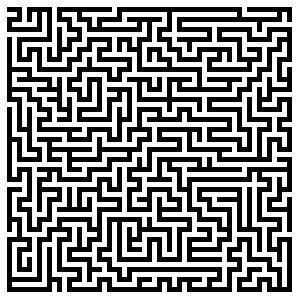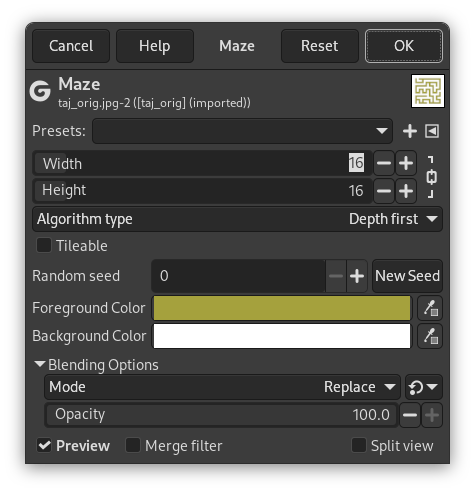Bu süzgeç rastgele siyah beyaz labirent örüntüsü oluşturur. Sonuç, etkin katmanın önceki içeriğinin üzerine yazılır. Bir örneği aşağıda gösterilmiştir. Merkezden kenara giden yolu bulabilir misiniz?
- Önayarlar, “Girdi Türü”, Kırpma, Harmanlama Seçenekleri, Ön izleme, Süzgeci birleştir, Bölünmüş görünüm
-
![[Not]](images/note.png)
Not Bu seçenekler şurada açıklanmıştır: Kısım 2, “Ortak Özellikler”.
- Genişlik, Yükseklik
-
These sliders control the size of the paths and walls in the maze. The lower the values for width and height, the more paths you will get. The result won't really look like a maze unless the width and height are equal.
By default, width and height are linked, indicated by the
chain symbol next to the input boxes. If you want to set width and height separately, click on that chain symbol to unlink them.
- Algoritma türü
-
Labirent için şu algoritmaları kullanabilirsiniz: Önce derinlik ve Prim algoritması. Yalnızca bir bilgisayar bilimci aralarındaki ayrımı söyleyebilir.
- Döşenebilir
-
Bunu bir örüntüne kullanmak istiyorsanız, bu onay düğmesini işaretleyerek labirenti döşenebilir yapabilirsiniz.
- Rastgele parçacık, Yeni Parçacık
-
This option controls the randomness of the filter. The Random seed box lets you manually enter a seed for the randomization algorithm used. You can also generate a random seed by pressing the button. If the same random seed is used in the same situation, the filter produces exactly the same results. A different random seed produces different results.
- Ön plan rengi, Arka plan rengi
-
Labirent ve arka planı için renk seçebilirsiniz. Ön tanımlılar Araç Kutusu renkleridir.





